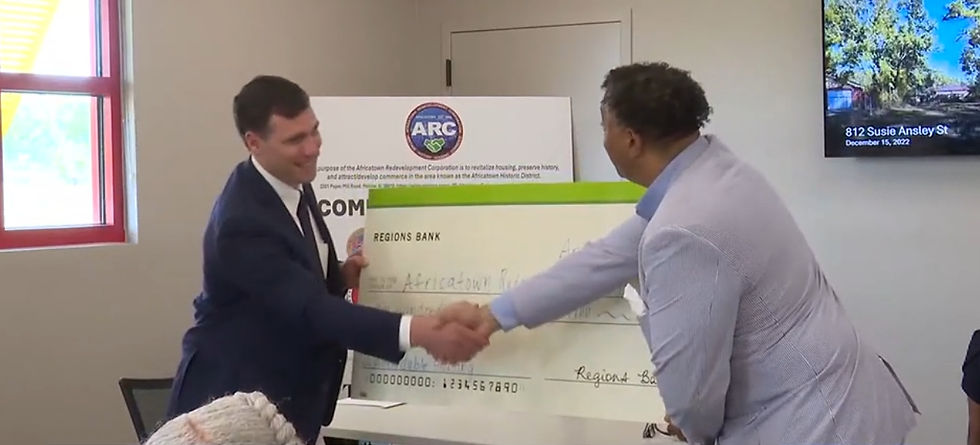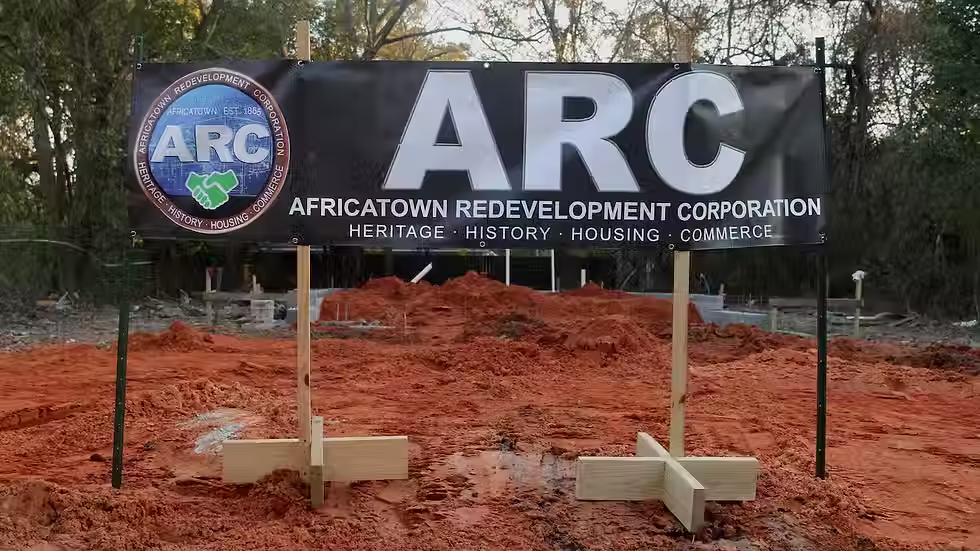A Path to Progress
- steeleimagemgmt
- May 31, 2023
- 6 min read
Known for his dedication to all things Mobile, Karlos Finley doesn’t need an introduction. An established lawyer with a deep family history tied to local civil rights, politics, preservation, and so much more, he’s taken a new role to guide us all towards a better tomorrow. Married to Kelly Finley, and super-star dad to Brik Finley, and bonus-dad to Stephen and Karrington Jones, Karlos is an upstanding citizen with an earned and interesting perspective on the topic of race relations in the Bay Area. The best part? It comes down to listening.
By Hayley Hill - May 2023 Originally published in ACCESS Magazine

With the discovery of the Clotilda in the Mobile Delta, the last known U.S. slave ship from 1860, our city has been highlighted in a range of national headlines bringing this long-needed conversation to the forefront of our shores. Quite simply, we’ve been presented with the opportunity to address our history—the good, bad, and ugly. For many, this is a topic that’s been met with a preference for silence or denied as it’s simply too harsh to take a closer look. And then there’s the old standby that it’s just the way it has always been — let’s just leave it alone, look away, and carry on. But we can, and we must, do better. Afterall, is it that hard to simply listen?
When the steps are taken to look a bit deeper, wounds and pain certainly exist. And when speaking with Karlos, one thing becomes clear—we need more open communication and a more informed understanding of our history. “We must know each other to work together towards a better tomorrow. Understanding how we’ve all contributed to our city is important to show that we all have ownership, and that we’re all due a return on the investment we’ve made in this community. It’s important that all are respected for doing their part. This hasn’t been the case historically,” Karlos shares.
It’s important to know addressing systemic racism makes economies stronger. In a recent study, economists state that in the last 20 years, racism has cost the U.S. economy $16 trillion. This is not insignificant as the U.S. gross domestic product (GDP) is $21 trillion. Recent local statistics show the race most likely to be in poverty in Mobile is Black, with 33.87% below the poverty line. Over half of our population is Black and those involved feel it’s more than possible to create change that will result in the betterment of our community and for all those calling the Bay Area home.
For Karlos, this begins with the willingness to have a conversation. And this is why the discovery of the Clotilda and the Netflix documentary, Descendant, are so key. Descendent is a culmination of years of work that tells the entwined stories of the search for, and salvaging of the Clotilda and the experiences of those people’s descendants, many of whom live in Africatown, an enclave north of Mobile. “Born and raised in Mobile, director Margaret Brown was educated on Africatown by my sister Dora. Dora told the story of the Clotilda and the Africans brought to this country illegally in Margaret’s first documentary, The Order of Myths. The team behind Descendant is a vast array of talented individuals that highlight generations of people with indomitable spirits. For my part in the film, I share a legal opinion regarding potential reparations for the descendants of the Africans illegally transported to the United States by Timothy Meaher and Caption William Foster,” he shares.
Clearly seeing a way forward for us all, Karlos says, “This documentary creates an opportunity for a worldwide audience to experience the truth of yet another tragic tale of the transatlantic slave trade, but also an example of how one can never underestimate the will of the human spirit. It’s a story of survival and the ability of a people to adapt, improvise, and overcome. It’s my greatest hope that this information provides a path to healing for our city, state, and nation. Slavery is the original sin of the United States. If we as a nation could come to the realization that the centuries of the transatlantic slave trade still have an impact on how we live today, it could be instrumental to us in reaching another level of understanding and justice for all. This experience provides an opportunity to do just that.”

Providing a relatable example, Karlos continues, “As a child, medicine didn’t taste good and sometimes I had to get a shot, which was even worse. But after taking my medicine a healing came about and ultimately, I felt better. Peeling back the layers of history is analogous to that experience. It’s better to take the medicine than allow the sickness to continue. And the sooner you take the medicine, the better and less severe the illness!”
Asking Karlos about the rebuttal we’ve overheard, he shares, “The Clotilda is a unique ship. It was not constructed for human cargo. The most accomplished shipwreck divers on the planet, world-renowned scientists, and historians have investigated this wreck site and made the determination that this ship is Clotilda. There will always be naysayers. As to why some wish to refuse to believe the science, we can’t give that energy. We must remain focused on the positive and the opportunity.”
Understanding Descendant is an opportunity for open conversations that would allow healing and growth in conjunction with cultural heritage tourism, the possibilities are endless. As for his part, Karlos shares, “My role in the community is and has been vast. I was an Assistant DA serving to protect the citizens of our county on behalf of the state and as a private attorney, I’ve acted as an advocate for plaintiffs who’ve been injured by the negligence of others. I’ve served as a Mobile Municipal Court Judge ensuring that justice is served in our community and my current and most recent role is as the Executive Director of the Africatown Redevelopment Corp. (ARC). This role allows me to create opportunities for those who traditionally have not had them and to create transformative change in one of the most historic communities in the world.”

Interestingly, in the 50s Africatown was a community of over 12,000 people. Today under 2,000 call it home. “Created by a legislative act sponsored by state representative Adline Clarke, my new role at ARC is to lead and fulfill our mission to revitalize housing, preserve history, and attract and develop commerce in the Africatown Historic District. We have a nine-member Board of Directors, seven appointed by elected officials, one appointed by The Clotilda Descendants Association, and one by the Africatown Heritage Preservation Foundation. Together, we can be transformative to the community of Africatown and the city of Mobile as a whole. Getting involved is a great way forward for all of us. Anyone can get involved by, of course, contributing financially to the ARC, but we also need boots on the ground help! Our monthly meetings are open to all and held at the Robert L. Hope Center every second Tuesday of the month at 4pm. The Heritage House Museum will open on July 8, 2023. Everyone can come learn this deep history and spread the knowledge of why it is important to know our collective past. We can’t know where we’re going unless we know where we’ve been,” he shares.
Knowing people often turn away from complicated subjects to evade blame or a tough topic, Karlos adds, “When it comes to blame, I see that term as irrelevant or inconsequential 162 years later. I see the relevant discussion revolving around facts and the ability to atone for past desecrations and advantages received coupled with the ability to repair as equitably as best possible.”
To maximize the efforts of ARC, it is safe to say that what Karlos and the Africatown community want most is for us all to find the willingness to accept our history and talk about it so we can all move forward together. “We must all realize that for centuries in this country it was not abnormal, nor was it punishable, for white citizens to lynch Black people. The Clotilda Africans and their descendants were cognizant of that fact. From the time of its arrival and into the late 60s, they dare not mention how their ancestors came here publicly, let alone that wealthy Mobile businessman, Timothy Meaher, his brothers, and their descendants, who were held in high regard, were the orchestrators of this illegal act. Let us not forget that Michael Donald, a Black teenage Mobilian, was lynched in Mobile in 1981.”
Curious as to where his insight and passion stem from, Karlos was inspired by generations of his own ancestors. “My great grandmother moved to Mobile in the 1860s. She and her two sons owned a block of land in The Bottom that they farmed and ultimately sub-divided and sold homes built by my grandfather, Johnny Finley. My father, James, and all his siblings, graduated from college and went on to become business owners and/or educators. He and his brother, John, became pharmacists and both owned independent pharmacies; “Finley’s Drugs” and “Finley’s Pharmacy.” From there, my father opened the first chain of African American owned drugstores in the state of Alabama. He ultimately owned seven operations and the one in Happy Hill (Africatown) opened in 1965 on the day I was born!”







Comments